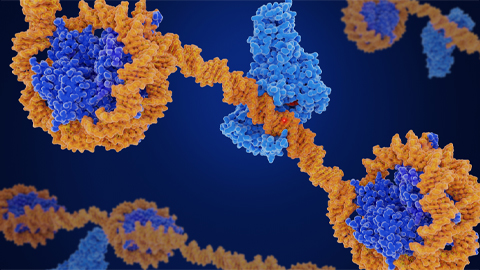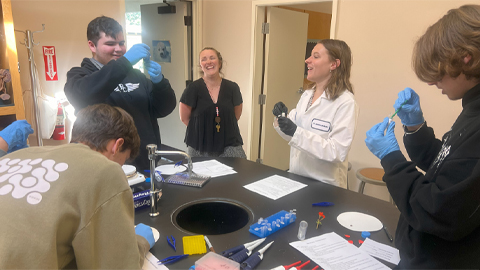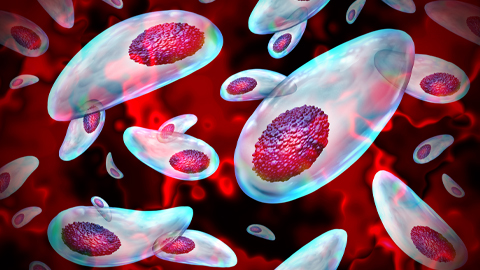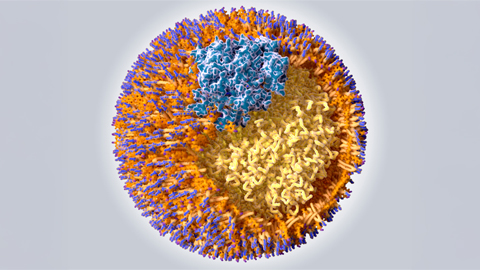What’s new with DNA and RNA?
Eukaryotic gene expression is regulated at multiple layers. This session will cover emerging new mechanisms of gene expression regulation, centered around DNA and RNA. We will hear updates on regulation at the nucleosome structure and chromatin conformation level, how noncoding RNAs could impact transcription, and RNA modifications in post-transcriptional gene expression regulation. This session also will introduce diverse modern imaging technologies to visualize transcription activity and spatial transcriptome.
Keywords: chromatin structure, noncoding RNA, RNA modifications, super-resolution imaging, spatial transcriptome
Who should attend: students, postdocs and anyone interested in gene expression regulation, nucleosome structure and chromatin conformation, noncoding RNA and RNA modifications, super-resolution imaging and spatial transcriptome
Theme song: "The DNA Song" by Jam Campus (parody of "Trap Queen" by Fetty Wap)
This session is powered by nucleic acids.
Talks
- Cracking the nucleus: Finding order in chaos — Clodagh O'Shea, Salk Institute
- EM structures of nucleosomes with chaperones — Karolin Luger, University of Colorado Boulder
- Structural mechanism of human telomerase holoenzyme — Kelly Nguyen, Medical Research Council Laboratory of Molecular Biology
- Studying DNA-related processes on DNA curtains — Ilya Finkelstein, University of Texas at Austin
- m6A in the action of regulating the regulators — Kathy (Fange) Liu, University of Pennsylvania
- Jeannie Lee, Massachusetts General Hospital
- RNA methylation multitasking on chromatin — Blerta Xhemalce, University of Texas at Austin
- RNA methylation in gene expression regulation — Chuan He, University of Pennsylvania
- Visualizing RNA in life cells — Timothy Stasevich, Colorado State University
- Visualizing the dynamic genome during development, Alistair Boettiger, Stanford University
- 3D in situ RNA sequencing — Xiao Wang, Broad Institute and Massachusetts Institute of Technology
- Engineering the repetitive 3D genome in human disease— Jennifer Phillips–Cremins, University of Pennsylvania
Learn more
Check out all ten thematic symposia planned for the 2022 ASBMB annual meeting:
- Diversity, equity and inclusion
- Protein machines and disorder
- Signaling
- Quality control in organelles
- Metabolism
- Enzymology
- RNA/DNA
- Membranes/lipids
- Glycobiology
- Education and professional development
Enjoy reading ASBMB Today?
Become a member to receive the print edition four times a year and the digital edition monthly.
Learn moreFeatured jobs
from the ASBMB career center
Get the latest from ASBMB Today
Enter your email address, and we’ll send you a weekly email with recent articles, interviews and more.
Latest in Science
Science highlights or most popular articles

CRISPR epigenome editor offers potential gene therapies
Scientists from the University of California, Berkeley, created a system to modify the methylation patterns in neurons. They presented their findings at ASBMB 2025.

Finding a symphony among complex molecules
MOSAIC scholar Stanna Dorn uses total synthesis to recreate rare bacterial natural products with potential therapeutic applications.

E-cigarettes drive irreversible lung damage via free radicals
E-cigarettes are often thought to be safer because they lack many of the carcinogens found in tobacco cigarettes. However, scientists recently found that exposure to e-cigarette vapor can cause severe, irreversible lung damage.

Using DNA barcodes to capture local biodiversity
Undergraduate at the University of California, Santa Barbara, leads citizen science initiative to engage the public in DNA barcoding to catalog local biodiversity, fostering community involvement in science.

Targeting Toxoplasma parasites and their protein accomplices
Researchers identify that a Toxoplasma gondii enzyme drives parasite's survival. Read more about this recent study from the Journal of Lipid Research.

Scavenger protein receptor aids the transport of lipoproteins
Scientists elucidated how two major splice variants of scavenger receptors affect cellular localization in endothelial cells. Read more about this recent study from the Journal of Lipid Research.


